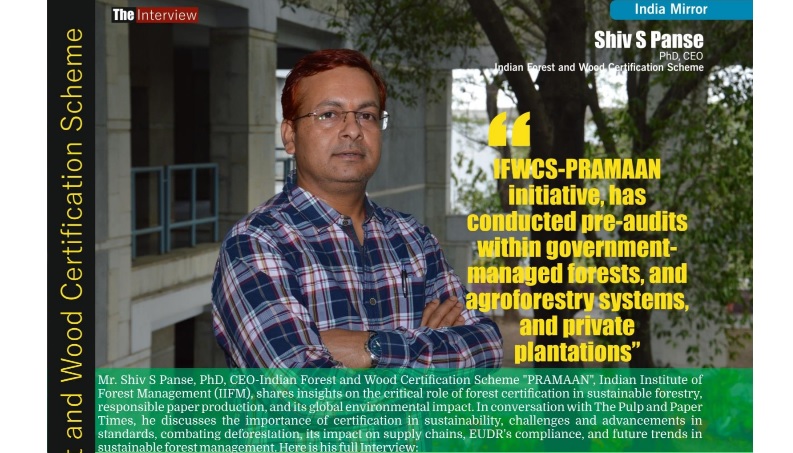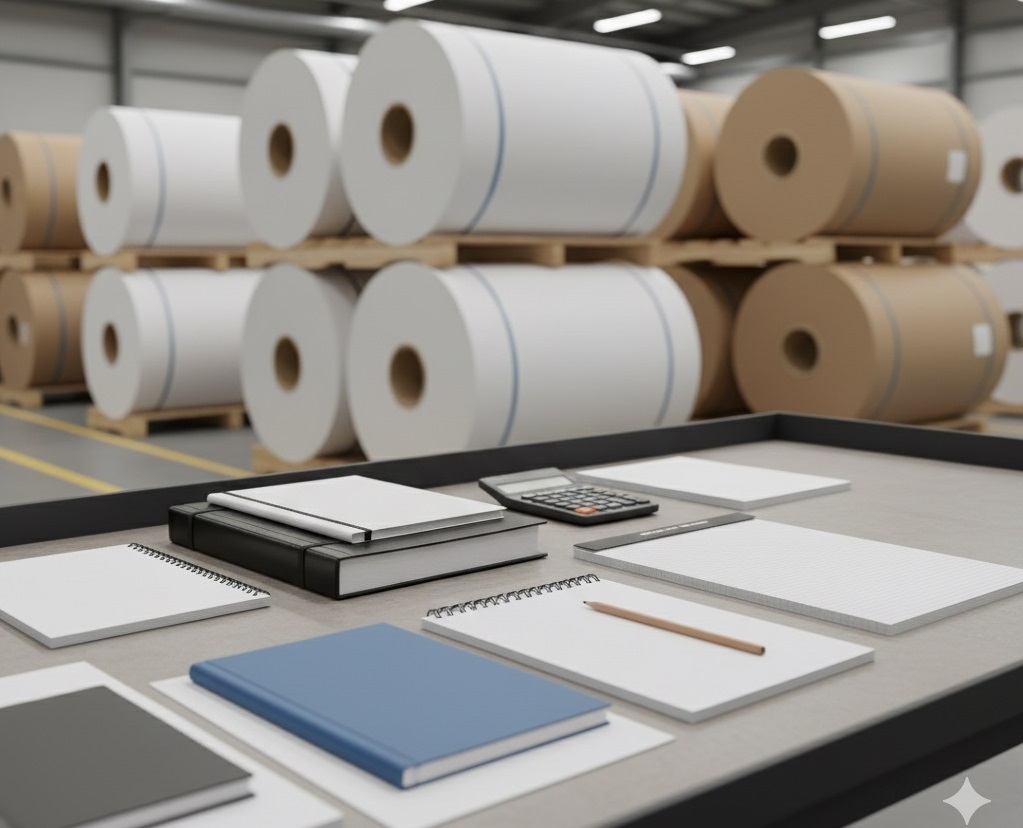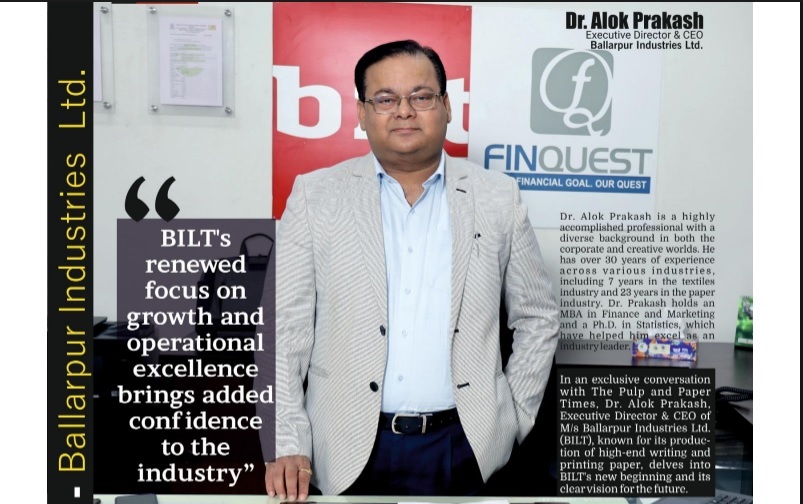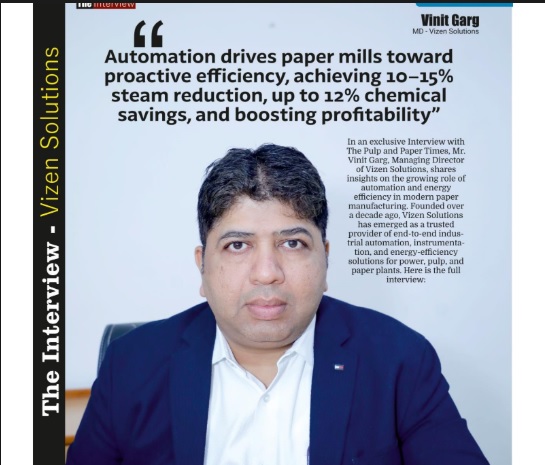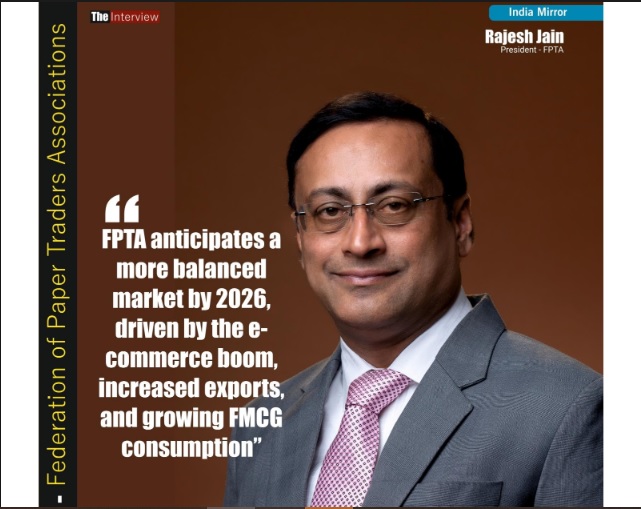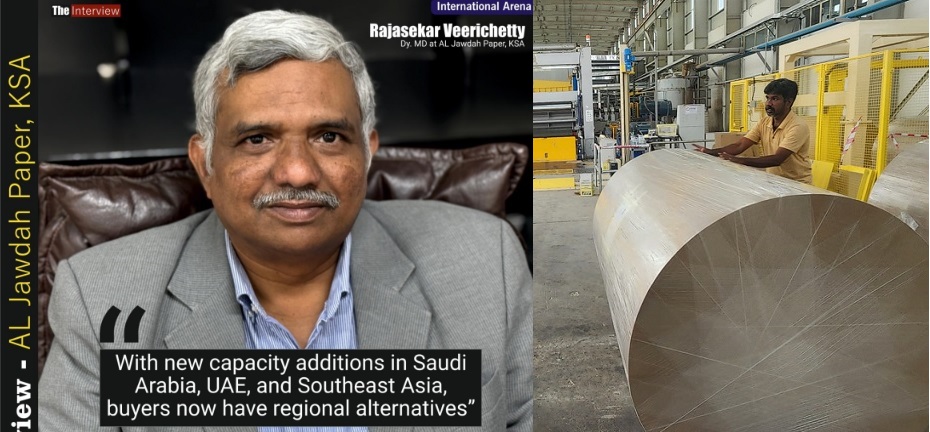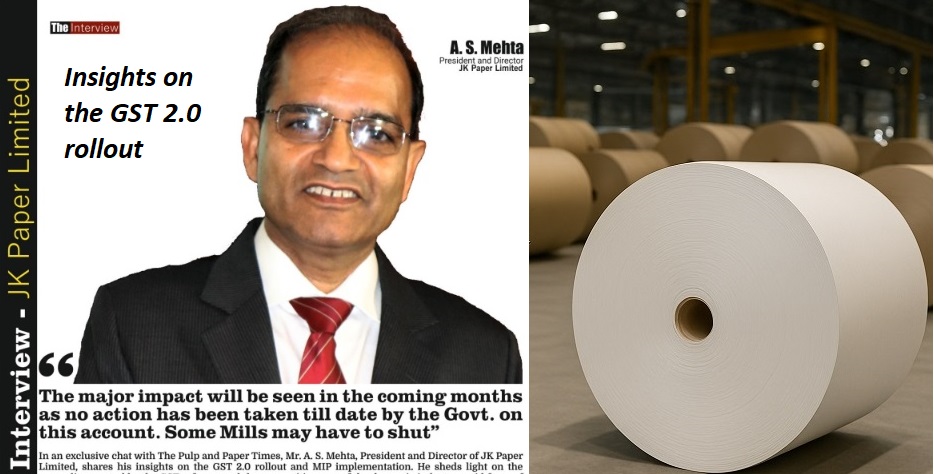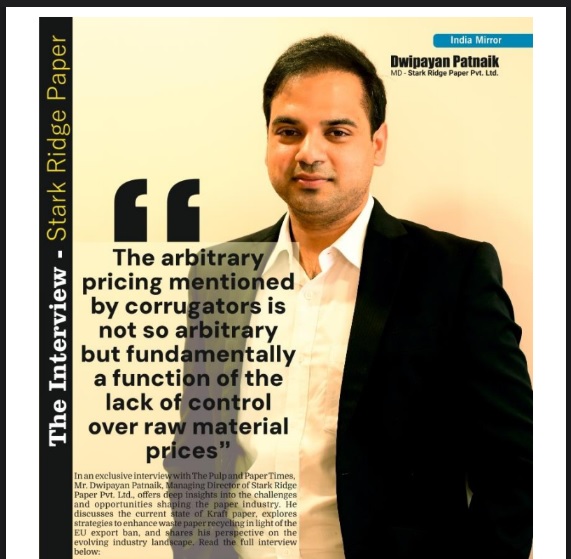We target niche segments like premium writing paper, which are less impacted by imports, Making our PM3 a 250TPD machine, says Mr. Harsh Goyanka of Bhola Ram Group
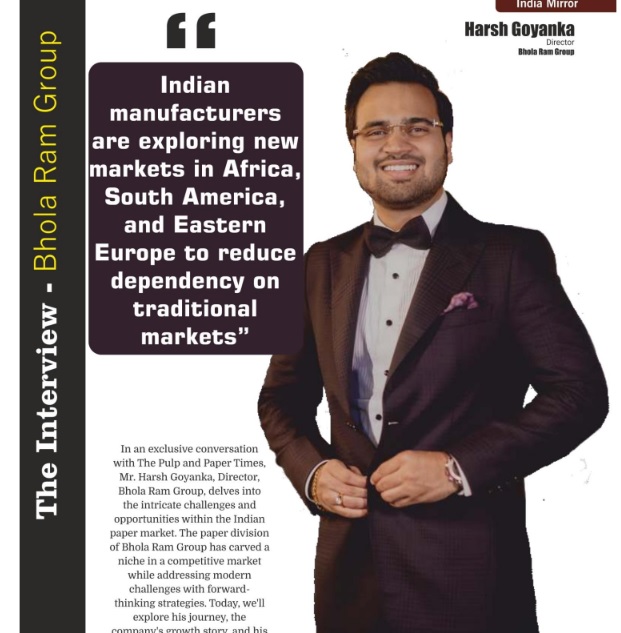
We target niche segments like premium writing paper, which are less impacted by imports, Making our PM3 a 250TPD machine, says Mr. Harsh Goyanka of Bhola Ram Group
-Indian manufacturers are exploring new markets in Africa, South America, and Eastern Europe to reduce dependency on traditional markets
-Bhola Ram Papers has leveraged these opportunities by focusing on premium products and sustainable practices
In an exclusive conversation with The Pulp and Paper Times, Mr. Harsh Goyanka, Director, Bhola Ram Group, delves into the intricate challenges and opportunities within the Indian paper market. The paper division of Bhola Ram Group has carved a niche in a competitive market while addressing modern challenges with forward-thinking strategies. Today, we’ll explore his journey, the company’s growth story, and his vision for the future.
The Pulp and Paper Times
Q: Please give us a small introduction of Bhola Ram Papers.
Bhola Ram Papers and Power Pvt. Ltd. is a proud part of the Bhola Ram Group, a diversified conglomerate engaged in multiple industries, including iron and steel, real estate, and finance. The company operates two state-of-the-art manufacturing units located in Arrah, Bihar, and Moradabad, Uttar Pradesh, with a combined production capacity of 650 tonnes of paper per day.
Bhola Ram Papers and Power Pvt. Ltd. is a leading manufacturer in the Indian paper industry, specializing in high-quality Maplitho paper, writing and printing grades, and newsprint. With manufacturing plants in Moradabad, Western U.P., and Arrah, Bihar, we are strategically positioned to cater to both domestic and international markets. The company has built its reputation on consistent quality, innovation, and sustainability. By adopting advanced technologies like surface sizing and maintaining a debt-free status, Bhola Ram Papers ensures that it delivers superior products without any compromise on environmental or operational standards.
Q: How do you evaluate your journey in the Paper Industry since your establishment?
Our journey has been one of consistent growth and innovation. From modest beginnings, Bhola Ram Papers has expanded its product portfolio and geographic reach. We’ve successfully implemented cutting-edge technologies, improved operational efficiencies, and maintained a customer-centric approach. Over the years, we’ve overcome challenges like fluctuating raw material costs, competition from imports, and evolving customer demands by staying committed to quality and sustainability. Today, we are proud to be recognized as a trusted brand in the paper industry, with a strong emphasis on delivering value to our stakeholders.
Q: Being a reputed paper manufacturer, could you give us your quick review of the present paper trade market scenario? About demand and supply dynamics of various grades of packaging paper?
The current paper trade market is marked by volatility. While demand for packaging materials has slowed due to global economic uncertainties, writing and printing grades continue to hold steady due to demand from educational institutions and publishing houses. On the supply side, excess capacity in Kraft and Duplex paper has led to competitive pricing pressures. However, this also presents opportunities for manufacturers who can differentiate themselves through quality, cost efficiency, and innovative solutions. Bhola Ram Papers has leveraged these opportunities by focusing on premium products and sustainable practices.
Q: Factors behind excess capacity and export decline in Kraft and Duplex paper mills.
The Indian Kraft and Duplex paper mills are facing significant challenges due to:
1.Overcapacity: Many mills expanded production during the post-COVID boom without anticipating the subsequent slowdown.
2.Decline in exports: Countries like China and South East Asia are now producing at lower costs, reducing their dependence on Indian exports.
3.Quality concerns: Issues such as odor, cracks, and spots in Indian Kraft paper have hurt buyer confidence.
4.Economic slowdown: A global economic slowdown has impacted demand for packaging materials.
To address these issues, Bhola Ram Papers has focused on improving product quality, optimizing production processes, and exploring new export markets to ensure resilience.
Q: How Bhola Ram Papers overcomes quality issues in Kraft paper for exports.
Bhola Ram Papers has implemented several measures to address quality issues:
1.Odor Control: We use advanced de-inking and chemical treatment technologies to eliminate unpleasant smells.
2.Crack Prevention: Our manufacturing processes ensure uniform fiber distribution, which minimizes cracks and enhances durability.
3.Spot Elimination: We conduct multiple quality checks and use high-grade raw materials to prevent spots and blemishes.
4.Customer Feedback: Regular engagement with buyers helps us address concerns proactively.
These steps have enabled us to rebuild trust with international buyers and establish a reputation for reliability and quality.
Q: can you throw some light on the WPP demand scenario amid the rising cheap import in white grade category?
The demand for writing and printing paper (WPP) has remained relatively stable due to its essential role in education and publishing. However, cheap imports from countries like China and Indonesia pose a challenge. Bhola Ram Papers has adopted the following strategies:
1. Differentiation through Quality: We produce superior-grade WPP that meets stringent standards, making it preferable over imports.
2. Cost Efficiency: By optimizing our production processes, we maintain competitive pricing.
3. Market Focus: We target niche segments like premium writing paper, which are less impacted by imports.
4. Advocacy: We work with industry bodies to address unfair trade practices and advocate for protective measures like anti-dumping duties.
Q: Will the export of finished Kraft paper decline remain permanent? Why or why not?
The current export decline is unlikely to be permanent. Several factors support this view:
1. Rising Costs in Competing Regions: Labor and production costs in South East Asia and GCC countries are increasing, which may reduce their competitive edge.
2. Sustainability Trends: Buyers are increasingly favoring eco-friendly products, and Indian mills like Bhola Ram Papers are well-positioned to meet these demands.
3. Diversification: Indian manufacturers are exploring new markets in Africa, South America, and Eastern Europe to reduce dependency on traditional markets.
4. While the current challenges are significant, a focus on quality, sustainability, and market diversification will help Indian exporters regain their footing.
Q: Waste paper procurement was a tough task for paper mills when the rate has been doubled from pre-lockdown pricing. How does your paper mill ensure a smooth raw material supply during the pandemic?
During the pandemic, raw material procurement became a critical challenge. Bhola Ram Papers ensured uninterrupted supply by:
1. Building Strong Supplier Relationships: We partnered with reliable suppliers and offered fair terms to ensure priority access to materials.
2. Local Sourcing: We increased reliance on domestic waste paper collection networks to reduce dependency on imports.
3. Inventory Management: By maintaining buffer stocks, we mitigated the impact of supply chain disruptions.
4. Innovation: We invested in recycling technologies to process lower-grade waste paper efficiently.
These measures ensured that our operations remained stable even during the most challenging periods.
Q: Please shed some light on the quality of paper products produced by Bhola Ram Papers? What technology is used by your company in order to remain competitive in the market.
At Bhola Ram Papers, quality is our top priority. We use advanced technologies like:
1. Surface Sizing: This enhances the strength, smoothness, and printability of our paper.
2. Automated Quality Control: Real-time monitoring ensures uniformity and minimizes defects.
3. Energy-Efficient Processes: We adopt eco-friendly practices to reduce our carbon footprint.
Our commitment to innovation and quality has enabled us to stay competitive and meet the evolving needs of our customers.
Q: Is Bhola Ram Papers undergoing any expansion?
we are expanding our operations by upgrading our PM3 unit with the installation of a film press. This will enable the machine to run at a speed of 800 meters per minute, ensuring the production of high-quality paper. Making our pm3 machine 250TPD machine.
With a focus on sustainability and advanced manufacturing practices, Bhola Ram Papers continues to set benchmarks in the paper industry.
These initiatives are aimed at strengthening our market position and preparing for future growth.
Q: The EU Commission has issued a proposal for the new legislation on the export of waste, What solution does Bhola Ram Papers think about this problem?.
The proposed EU regulation on waste paper exports poses a challenge for Indian mills. Bhola Ram Papers is preparing by:
1.Strengthening Domestic Collection: Collaborating with local waste management companies to ensure a steady supply of raw materials.
2. Investing in Recycling: Enhancing our recycling capabilities to process alternative raw materials.
3. Policy Advocacy: Engaging with government and industry bodies to negotiate favorable trade terms.
By taking proactive measures, we aim to minimize the impact of these restrictions.
Q: Sustainability is a growing concern for both consumers and businesses. What steps will you take to ensure Bhola Ram Papers remains a leader in environmentally responsible practices?
Sustainability is integral to Bhola Ram Papers’ operations. We are committed to:
1. Reducing Waste: Implementing zero-waste production practices.
2. Energy Efficiency: Using renewable energy sources and optimizing energy consumption.
3. Water Conservation: Recycling water in our manufacturing processes.
4. Sustainable Sourcing: Procuring raw materials from eco-friendly sources.
These efforts not only reduce our environmental impact but also align with the growing demand for sustainable products.
Web Title: We target niche segments like premium writing paper, which are less impacted by imports, says Mr. Harsh Goyanka of Bhola Ram Group




 Join WhatsApp Group
Join WhatsApp Group Join Telegram Channel
Join Telegram Channel Join YouTube Channel
Join YouTube Channel Join Job Channel (View | Submit Jobs)
Join Job Channel (View | Submit Jobs) Join Buy Sell Channel (Free to Submit)
Join Buy Sell Channel (Free to Submit) Paper News Headlines Channel (Free to read)
Paper News Headlines Channel (Free to read)



